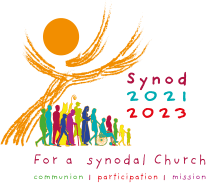The Church of God is Convoked in Synod: A Reflection on Synodality
By Mar Muñoz-Visoso, Executive Director, Secretariat of Cultural Diversity in the Church
Pope Francis has called the church world-wide to reflect on synodality as the path for the Church. Synodality is both her way of being and of fulfilling her mission in the world. What is synodality? The term comes from the Greek syn-odos, and it has been translated in different ways: “walking together”, “journeying together”, “walking alongside”, in a sense, being, moving and operating together.
It is not a new concept. In fact, it is a very ancient practice. As the Preparatory Document for the Synod reminds us, it was the ordinary way in which the Church acted in the first millennium (PD, 11). And even at those times when the hierarchical functions were more strongly emphasized in subsequent centuries, the Church never lost her synodal dimension through the celebration of local, diocesan and provincial synods and universal or Ecumenical Councils, pastoral councils, etc. Synodality is a constitutive element of her being.
The Second Vatican Council calls for a return to the sources (resourcement) and for an update” (aggiornamento), a reading of the signs of the times. The Council is anchored in this dynamic of Tradition and puts an emphasis in rediscovering the Church as the People of God. (PD 12). The Council also emphasized how, by virtue of the anointing of the Holy Spirit received in Baptism, the totality of the Faithful “cannot err in matters of belief.” (Sensus fidei) (PD 13).
For this reason, the pastors, established by God as “authentic guardians, interpreters, and witnesses of the faith of the whole Church,” should not be afraid to listen to the Flock entrusted to them. (PD 14, quoting Pope Francis’ address at the Ceremony Commemorating the 50th Anniversary of the Institution of the Synod, October 17, 2015)
The consultation of the People of God does not imply the assumption within the Church of the dynamics of democracy based on the principle of majority, because there is, at the basis of participation in every synodal process, a shared passion for the common mission of evangelization and not the representation of conflicting interests… It is in the fruitful bond between the sensus fidei of the People of God and the magisterial function of the Pastors that the unanimous consensus of the whole Church in the same faith is realized. Every synodal process, in which the Bishops are called to discern what the Spirit is saying to the Church, not by themselves but by listening to the People of God, …is an evident form of that “journeying together” which makes the Church grow. (PD 14).
As the modus vivendi and the modus operandi of the Church, synodality goes beyond mere consultation. It’s about listening and learning from one another, discerning together what is the will of the Holy Spirit at this time and in this moment, informing the decision making and taking action together. Again, it is about the Shepherds and the People of God entrusted to their care “journeying together,” and never one without the other (the bishops without the People of God, or the people without their shepherds).
The opening words of the preparatory document for the upcoming Synod on Synodality are “The Church of God is convoked in Synod”. It does not say “the Bishops are convoked”, but the whole Church of God is convoked. Sure, an important part of the synodal process will be the General Assembly of the Synod of Bishops, in October of 2023. But to get there, and for that assembly of bishops to be fruitful, for it to fulfill its mandate, a church-wide consultation of the People of God needs to take place first, beginning with the consultation of the local/diocesan churches and ending with their involvement again in the implementation phase.
With this convocation, Pope Francis invites the entire Church to reflect on a theme that is decisive for its life and mission: “It is precisely this path of synodality which God expects of the Church of the third millennium.” This journey, which follows in the wake of the Church’s “renewal” proposed by the Second Vatican Council, is both a gift and a task: by journeying together and reflecting together on the journey that has been made, the Church will be able to learn through Her experience which processes can help Her to live communion, to achieve participation, to open Herself to the mission. Our “journeying together” is, in fact, what most effectively enacts and manifests the nature of the Church as the pilgrim and missionary People of God. (PD, 1).
For the greater glory of God, let’s be part of a Church that journeys together towards the establishment of the Kingdom of God.
To download the Synod Prayer and other Synod resources, please visit: https://www.synod.va/en.html

